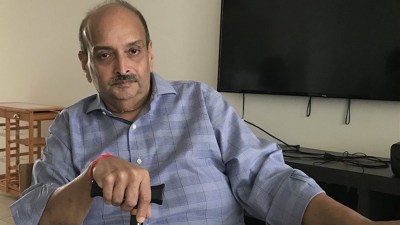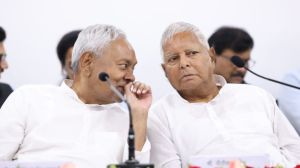Shashi Tharoor interview: ‘Key for de-escalation with Pak, if China gives a message, we may see them dialing down’
Shashi Tharoor interview: "India is a status quo power, we want nothing that Pakistan has … it is not in India’s interest to play into Pakistan’s hands by prolonging this conflict," says Congress MP who heads the Parliament’s Standing Committee on External Affairs.
 "Pakistan is a revisionist power, it claims territory India holds, it is a bigoted power that wishes to take over parts of India on the grounds that the people living there happen to share the same religion as the Pakistanis," Shashi Tharoor said. (Express photo by Chitral Khambhati)
"Pakistan is a revisionist power, it claims territory India holds, it is a bigoted power that wishes to take over parts of India on the grounds that the people living there happen to share the same religion as the Pakistanis," Shashi Tharoor said. (Express photo by Chitral Khambhati)After a night of blackouts in over 15 cities all the way from J&K and Punjab to Rajasthan and Gujarat, and cross-border drone and missile strikes from Pakistan, which were repelled by India’s defence systems, a clear, articulate framing of the challenge and the road ahead has come from Congress MP, former diplomat and author Shashi Tharoor who also heads Parliament’s Standing Committee on External Affairs.
Excerpts from the interview with Shashi Tharoor:
*Thursday night we saw a sharp escalation by Pakistan. Where do you see this going?
I had been of the view that Pakistan would know better than to escalate with attacks against Indian facilities, because India had taken such care to convey that ours were not meant to be the first step of a protracted war, but rather a one-off retaliation for the Pahalgam attack. We had demonstrated that by the fact that we chose only known terrorist sites, we had been very careful to ensure we attacked at night when there were no civilians about, so we would minimise collateral damage, and we had carefully avoided both military and government installations of Pakistan. Therefore the signal was very clear – this is only a reprisal for terrorism, nothing else.
Now, the Pakistanis have chosen to respond, first of all, through very heavy artillery shelling… So many have been killed and hospitalised with severe injuries in Jammu’s Poonch alone. That has been unfortunate. We have replied in kind, but then sending missile and drone attacks across the border to Indian military and civilian facilities was unforgivable and warranted the kind of response India has given. That means Pakistan has put a foot on the escalatory ladder, not India. I think India’s position and signalling has remained consistent. If you don’t escalate, we will not escalate. We are not the ones creating a war. That is a very consistent message.
But the problem with escalation is that it is very difficult to control, and at this stage, the key is still in the hands of the Pakistanis. It is very easy for them to tell their public that their honour is satisfied with the attacks they have made and stop this. But if they keep going up, they’re really asking for very, very severe consequences.
*What would these consequences be?
I don’t think that anybody seriously doubts that the Indian Army has a greater capacity to prevail in a longer and more serious conflict than the Pakistani army. The Pakistani economy is in a terrible shape. They don’t have the sustainability on their end. So, common sense would dictate that it would be in their interest as well to dial this down. India has been very clear in its signaling that we have no desire to get into a war. We just wanted to make sure that terrorists don’t believe they can kill and leave with impunity.
Frankly, I think that message has been very well understood around the world, and at least three countries, including Russia and France, have publicly expressed understanding for our positions. Others have not said so in as many words, but there is a perception that there is certainly some understanding for the Indian position.
So now India is probably – and I don’t have any access to classified information – on the phones to tell the rest of the world, ‘We do not want this to get out of hand, tell the Pakistanis to behave’. The Chinese, for example, on the very first day, issued a rather interesting statement, where, instead of what some of us expected – a sort of ringing endorsement of support for Pakistan – they actually said, ‘Both India and Pakistan are our neighbours, and we don’t want to see fighting in the neighbourhood’. They said we want calm and peace, and if that is the kind of message they give to GHQ Rawalpindi (Pakistan), we might actually see them dialing down. But it’s anybody’s guess.
We are sitting here in India trying to guess what is occupying the minds of these characters in Pakistan, and it’s difficult to say, because for the Pakistani military, very often their self-interest is more important than any other consideration. The Pakistani military may well figure that a war with India is the only way to ensure they can salvage their faltering position in the Pakistani public imagination. They have been (getting) increasingly unpopular, with the incarceration of (former Prime Minister) Imran Khan and with the complete failure of their puppet government to revive the economy. And, therefore, this may strike some people in the military as the way to go in their self-interest, that is the only concern.
*Over the years, India has been able to get the world to dehyphenate it with Pakistan. How’s that playing out now?
Unfortunately, (hyphenation) was definitely one of the objectives of the Pahalgam attack, and what is more, the attempts to internationalise the Kashmir dispute, which of course we will never agree to. Very clearly, what they wanted was to bring us back on the international agenda because of the last few years of increased normalisation and the dramatic growth in tourism (in J&K), which was also having a tremendously positive effect on the Kashmiri economy, thereby increasing the goodwill for the rest of India inside Kashmir. So they wanted to strike at all of that.
They wanted to affect the economy, they wanted to increase disaffection in Kashmir for the rest of India and they also wanted to re-hyphenate and re-internationalise Kashmir. We are not going to let them get away with this. They will not be allowed to achieve at the point of a gun what they could not achieve through any other means so far, and I think that we will never agree to any sort of discussion, negotiation, mediation, because of what has happened.
But in the meantime, you’re quite right… Even United States President Donald Trump’s statement that these two have been fighting for centuries and so on; it may be an uninformed statement, but it is typical of the general reaction around the world, and to some degree, a certain weariness with this back and forth.
*If de-escalation is in Pakistan’s hands, what’s the next step?
It’s very much in India’s interest to shut this down sooner rather than later.
First of all, because we don’t want to internationalise and prolong this global perception of what is going on. Secondly, the longer it goes on, the more the risk of international involvement, which we definitely don’t want to see. And thirdly, we are really focused on our own economic growth, on the wellbeing and prosperity of our people. We don’t want to be derailed by an unnecessary war.
Remember, one thing that was very clearly understood is that India is a status quo power, we want nothing that Pakistan has. As far as I’m concerned, the only country that wants to upset the existing geopolitical arrangements on the subcontinent is Pakistan, and, therefore, it is not in India’s interest to play into Pakistan’s hands by prolonging this conflict.
Pakistan is a revisionist power, it claims territory India holds, it is a bigoted power that wishes to take over parts of India on the grounds that the people living there happen to share the same religion as the Pakistanis. There are 200 million Indian Muslims who share the same religion as the Pakistanis. Do they want to take over all of them? It’s a preposterous approach that the Pakistanis have been adopting. They have been deploying terrorists for 30 years in pursuit of their desire to bleed India by a thousand cuts and capture the territory of Kashmir. They are not going to get it.
*How do you see the global response and the Government’s diplomatic outreach?
I don’t know first-hand what the nature of the outreach is. I am assuming that both the External Affairs Minister and the National Security Advisor have been very much working the phones. But, at the end of the day, there is a thin line to be drawn from trying to explain our position to all of those countries and doing anything that would be perceived as a kind of request for mediation, because that is completely against our policy. So, I’m sure it’s being done in a very calibrated manner.
*US Vice-President J D Vance has said America is not going to get involved in a war ‘that is fundamentally none of our business’.
Mediation is not something we want. And Vance must have understood that message. India is not looking for any US mediation. So to that degree, Vance’s comment is reminiscent of then US Secretary of State Jim Baker’s famous comment in the early ’90s about the Yugoslav War that, ‘We don’t have a dog in this fight’. But if the fight gets a little more unpleasant, then certainly they will have a desire to get involved to some degree, because there is a presumed interest in world order and world peace, which is at the moment being threatened.



- 01
- 02
- 03
- 04
- 05




























